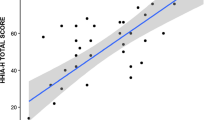Abstract
In order to assess psychosocial and auditory handicap in Indian patients with unilateral sensorineural hearing loss (USNHL), a prospective study was conducted on 50 adults with USNHL in the ENT Outpatient clinic of a tertiary care centre. The hearing handicap inventory for adults (HHIA) as well as speech in noise and sound localization tests were administered to patients with USNHL. An equal number of age-matched, normal controls also underwent the speech and sound localization tests. The results showed that HHIA scores ranged from 0 to 60 (mean 20.7). Most patients (84.8 %) had either mild to moderate or no handicap. Emotional subscale scores were higher than social subscale scores (p = 0.01). When the effect of sociodemographic factors on HHIA scores was analysed, educated individuals were found to have higher social subscale scores (p = 0.04). Age, sex, side and duration of hearing loss, occupation and income did not affect HHIA scores. Speech in noise and sound localization were significantly poorer in cases compared to controls (p < 0.001). About 75 % of patients refused a rehabilitative device. We conclude that USNHL in Indian adults does not usually produce severe handicap. When present, the handicap is more emotional than social. USNHL significantly affects sound localization and speech in noise. Yet, affected patients seldom seek a rehabilitative device.
Similar content being viewed by others
References
Newman CW, Jacobson GP, Hug GA, Sandridge SA (1997) Perceived hearing handicap of patients with unilateral or mild hearing loss. Ann Otol Rhinol Laryngol 106:21–24
Chiossoine-Kerdel JA, Baguley DM, Stoddart RL, Moffat DA (2000) An investigation of the audiologic handicap associated with unilateral sudden sensorineural hearing loss. Am J Otol 21:645–651
Newman CW, Weinstein BE, Jacobson GP, Hug GA (1990) The Hearing Handicap Inventory for Adults: psychometric adequacy and audiometric correlates. Ear Hear 11:430–433
Ventry I, Weinstein B (1982) The Hearing Handicap Inventory for the Elderly: a new tool. Ear Hear 3:128–134
Newman CW, Weinstein BE, Jacobson GP, Hug GA (1991) Test-retest reliability of the Hearing Handicap Inventory for Adults. Ear Hear 12:355–357
Colletti V, Fiorino FG, Carner M, Rizzi R (1988) Investigation of the long term effects of unilateral hearing loss in adults. Br J Audiol 22:113–118
Subramaniam K, Eikelboom RH, Eager KM, Atlas MD (2005) Unilateral profound hearing loss and the quality of life after cerebellopontine angle surgery. Otolaryngol Head Neck Surg 133:339–346
Humes LE, Allen SK, Bess FH (1980) Horizontal sound localization skills of unilaterally hearing-impaired children. Audiology 19:508–518
Jensen JH, Johansen PA, Borre S (1989) Unilateral sensorineural hearing loss in children and auditory performance with respect to right/left ear differences. Br J Audiol 23:207–213
Welsh LW, Rosen LF, Welsh JJ, Dragonette JE (2004) Functional impairments due to unilateral deafness. Ann Otol Rhinol Laryngol 114:987–994
Jensen JH, Borre S, Johansen PA (1989) Unilateral sensorineural hearing loss in children: cognitive abilities with respect to right/left ear differences. Br J Audiol 23:215–222
Bess FH, Tharpe AM, Gibler AM (1986) Auditory performance of children with unilateral sensorineural hearing loss. Ear Hear 7:20–26
Kimura D (1961) Cerebral dominance and the perception of verbal stimuli. Can J Exp Psychol 15:166–171
Sargent EW, Herrmann B, Hollenbeak CS, Bankaitis AE (2001) The minimum speech test battery in profound unilateral hearing loss. Otol Neurotol 22:480–486
Acknowledgments
We would like to acknowledge with gratitude, the role of Dr. Rajeev Kumar who helped with the collection of data and Ms. Tunny Sebastian for her help with data analysis. This study was supported by a FLUID research grant from Christian Medical College, Vellore, India.
Conflict of interest
The authors declare that they have no conflict of interest.
Author information
Authors and Affiliations
Corresponding author
Rights and permissions
About this article
Cite this article
Augustine, A.M., Chrysolyte, S.B., Thenmozhi, K. et al. Assessment of Auditory and Psychosocial Handicap Associated with Unilateral Hearing Loss Among Indian Patients. Indian J Otolaryngol Head Neck Surg 65, 120–125 (2013). https://doi.org/10.1007/s12070-012-0586-6
Received:
Accepted:
Published:
Issue Date:
DOI: https://doi.org/10.1007/s12070-012-0586-6




